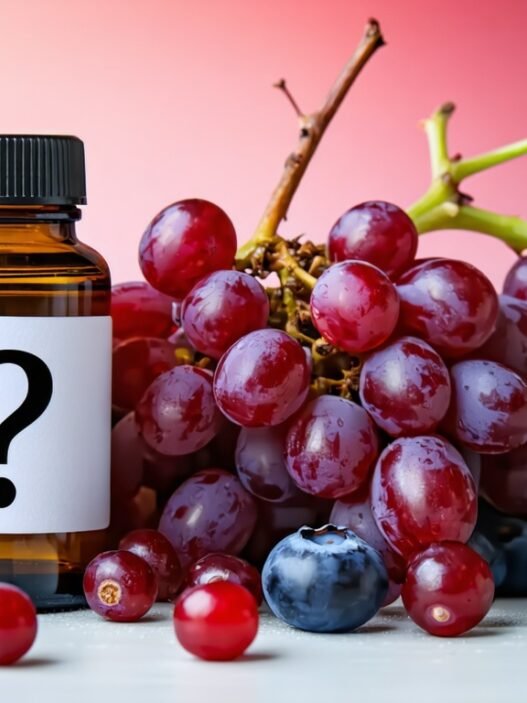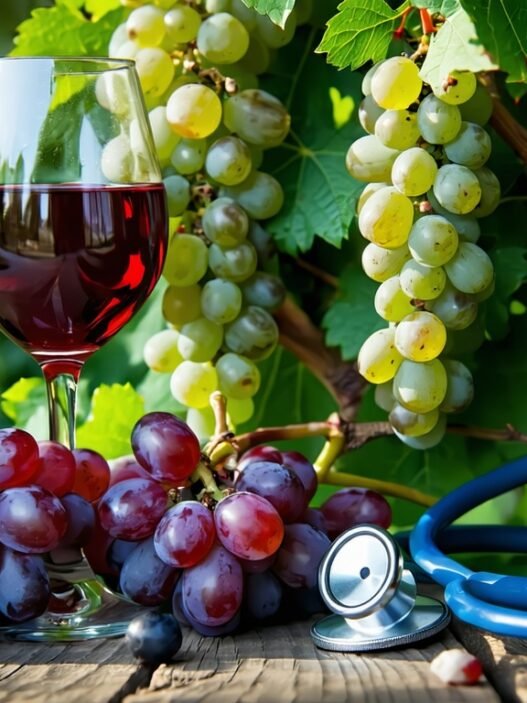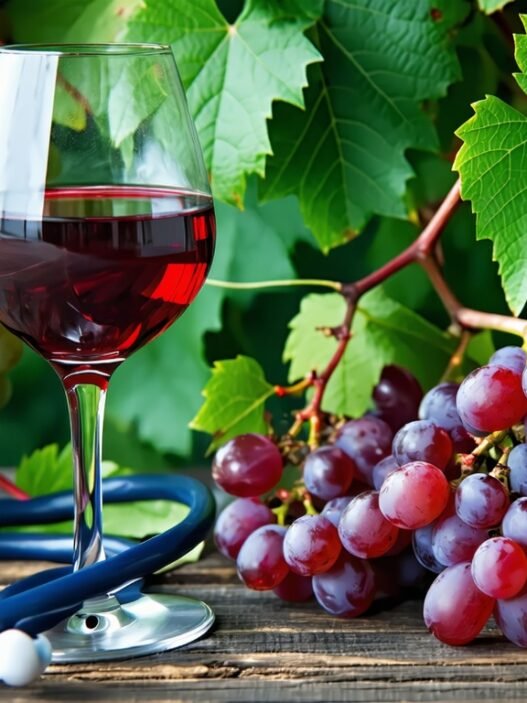Understanding Resveratrol
Introduction to Resveratrol
Resveratrol is a natural compound that belongs to a group known as polyphenols, recognized for its antioxidant properties. This powerful phytochemical is predominantly found in red wine, grapes, certain berries, and peanuts. The concentration of resveratrol is particularly high in the skins and seeds of grapes and berries, which is why red wine, made from the fermentation process that uses these parts, contains significant levels of this compound.
The interest in resveratrol has grown due to its potential health benefits, particularly in relation to longevity and anti-aging effects. Natural health seekers often inquire about why is resveratrol controversial and who should avoid it? as new studies and insights emerge about this compound.
Food Sources of Resveratrol
Resveratrol can be acquired through various food sources, predominantly those associated with plant-based diets. The following table highlights some of the primary sources of this beneficial compound:
| Food Source | Approximate Resveratrol Content (mg per serving) |
|---|---|
| Red Wine | 1 – 2 (per 5 oz) |
| Red Grapes | 0.24 – 1.25 (per 100g) |
| Peanuts | 0.03 – 0.17 (per 100g) |
| Blueberries | 0.04 (per 100g) |
| Cranberries | 0.07 – 0.08 (per 100g) |
Manufacturers also offer resveratrol supplements, with many supplements in the U.S. containing extracts from the Asian plant Polygonum cuspidatum or from red wine and grape extracts. It’s important for health and wellness enthusiasts to be informed about potential interactions, as well as the overall safety of resveratrol, particularly when considering its role in is resveratrol bad for the heart? and other specific health conditions.
Potential Health Benefits
Resveratrol has garnered attention for its potential to promote health and longevity. This section focuses on its anti-aging properties and its abilities to combat diseases.
Anti-Aging Properties
Research indicates that resveratrol may possess notable anti-aging qualities. Animal studies have demonstrated that it could extend lifespan by activating specific genes linked to longevity, which protect against age-related diseases (Healthline). However, how effectively this translates to humans remains uncertain.
One of the proposed mechanisms of resveratrol’s anti-aging effect is its ability to reduce oxidative stress and inflammation, factors often associated with aging. It may also help slow down cognitive decline associated with aging due to its antioxidant and anti-inflammatory properties, potentially protecting brain cells from damage (Healthline).
| Benefits | Mechanism |
|---|---|
| Potential lifespan extension | Activates longevity genes |
| Cognitive protection | Reduces oxidative stress and inflammation |
| Slows age-related decline | Antioxidant properties |
For further insights on the anti-aging potential of resveratrol, check our article on does resveratrol reverse aging?.
Disease-Fighting Abilities
Resveratrol appears to have potential disease-fighting capabilities, particularly in preventing common conditions such as cancer, cardiovascular disease, and diabetes. Studies suggest that it may inhibit cancer cell growth, influence signaling, and promote apoptosis (cell death), making it a focus for cancer research.
With regards to cardiovascular health, resveratrol may help lower “bad” cholesterol and reduce the risk of heart disease by decreasing inflammation and preventing clot formation. Furthermore, it activates the SIRT1 gene, which is thought to protect against obesity and aging-related diseases, thereby contributing to overall heart health (WebMD).
| Diseases | Potential Benefits |
|---|---|
| Cancer | Inhibits cell growth and promotes cell death |
| Heart Disease | Lowers cholesterol, reduces inflammation |
| Diabetes | Prevents insulin resistance and obesity-related issues |
For more information on how resveratrol may affect heart health, refer to our article on is resveratrol bad for the heart? and the potential anti-carcinogenic properties found in resveratrol by visiting is resveratrol anti-carcinogenic?.
Safety and Considerations
Exploring the safety and potential risks associated with resveratrol is essential for those interested in its health benefits. Understanding side effects, interactions with medications, and who should avoid this supplement can help inform decisions regarding its use.
Side Effects and Allergic Reactions
Resveratrol is generally considered safe, and studies have not reported severe side effects, even in large doses. However, allergic reactions may occur, particularly in individuals who are sensitive to grapes or wine, the primary sources of resveratrol. Some individuals may experience mild side effects such as stomach upset, especially at higher dosages.
For those considering resveratrol supplementation, the natural amount found in foods is typically safe for daily consumption in low to medium doses. High doses, up to 3,000 milligrams per day, can be taken for limited periods, but caution is advised. Individuals with specific health concerns, such as bleeding disorders or estrogen-sensitive conditions, should consult a healthcare provider before taking resveratrol, as it may exacerbate some health issues.
| Side Effects | Description |
|---|---|
| Allergic Reactions | May occur in individuals allergic to grapes or wine |
| Stomach Upset | May happen at higher doses |
| Bruising/Bleeding | Increased risk for those with bleeding disorders |
For more detailed effects of resveratrol on specific health conditions, see our articles on is resveratrol bad for the heart? and is resveratrol bad for thyroid?.
Interactions with Medications
Resveratrol may interact with various medications, particularly those metabolized by the liver. This includes medications affected by the Cytochrome P450 enzymes, such as CYP3A4, CYP1A1, CYP1A2, CYP1B1, CYP2C19, and CYP2E1. These interactions can potentially alter the effectiveness and side effects of the medications being taken (WebMD).
Additionally, resveratrol may slow blood clotting. When taken alongside anticoagulant or antiplatelet drugs, it can increase the risk of bruising and bleeding. Individuals on these medications or those planning surgery should avoid resveratrol supplementation unless advised otherwise by a healthcare provider.
For further insights into potential interactions, refer to our article on can I take coq10 and resveratrol together? and learn about the anti-carcinogenic properties of resveratrol at is resveratrol anti-carcinogenic?.
Controversies Surrounding Resveratrol
The discussion surrounding resveratrol is marked by both interest and skepticism due to various controversies. Understanding these issues is crucial for those considering its use in their health regimen.
Lack of Sufficient Data
One of the core controversies regarding resveratrol stems from the lack of consistent and robust data supporting its benefits. While some clinical trials indicate that resveratrol has a favorable impact on neurological disorders, cardiovascular conditions, and diabetes, the results vary based on factors such as dosage, type of disease, and treatment duration. This inconsistency raises questions about its actual efficacy.
In cancer studies, the findings are also mixed. Resveratrol’s effectiveness varies depending on the cancer type and stage, highlighting the need for further investigation to evaluate its potential role in cancer treatment. The inconsistency in research findings contributes to the overall skepticism surrounding why resveratrol is controversial and who should avoid it.
| Study Type | Findings |
|---|---|
| Neurological Disorders | Beneficial effects noted, more research needed |
| Cardiovascular Diseases | Favorable impacts observed |
| Cancer Trials | Mixed results based on type and stage |
| Obesity Studies | Inconclusive results |
Regulatory Challenges and Recommendations
Another point of contention is the regulatory status of resveratrol. In various countries, resveratrol is marketed as a dietary supplement, which can lead to variability in product quality and concentration. Unlike pharmaceuticals, dietary supplements are not strictly regulated, meaning the potency and purity of resveratrol supplements can differ widely among brands.
Due to the unanswered questions about safety and effectiveness, specific groups are advised to approach resveratrol with caution. Individuals with certain health conditions or those taking medications may face risks when combined with resveratrol, such as potential interactions. Resources are available to help consumers understand if resveratrol is bad for the heart? or is resveratrol bad for thyroid?.
As ongoing research seeks to clarify these issues, it is recommended that consumers consult healthcare professionals prior to starting any resveratrol supplementation. This ensures informed decisions are made based on individual health needs. For more insights on dosage and potential interactions, it may be beneficial to read about can I take coq10 and resveratrol together?.
The mixed findings and quality control issues in the supplement industry highlight the importance of careful consideration before incorporating resveratrol into health practices.
Resveratrol and Specific Health Conditions
Resveratrol is often touted for its potential health benefits, particularly regarding heart health and its impact on blood pressure and cholesterol levels.
Heart Health Benefits
Research suggests that resveratrol may help protect against heart disease by reducing inflammation, lowering “bad” cholesterol, and preventing clot formation that can lead to a heart attack. Additionally, it activates the SIRT1 gene, which may help prevent insulin resistance and reduce the risk of diabetes and age-related diseases (WebMD).
Several studies demonstrate the following potential heart health benefits of resveratrol:
| Benefits of Resveratrol | Evidence |
|---|---|
| Reduces inflammation | Can potentially lower heart disease risks |
| Lowers “bad” LDL cholesterol | Positive impact on cholesterol profiles |
| Prevents clot formation | Reduces risks of heart attacks |
| Activates SIRT1 gene | Protects against obesity and age-related diseases |
Impact on Blood Pressure and Cholesterol
Resveratrol supplements may aid in lowering blood pressure by increasing nitric oxide production, which helps relax blood vessels and improve circulation. However, specific recommendations on the optimal dosage for these benefits are still being researched.
Additionally, studies indicate that resveratrol can positively influence blood fat levels by reducing total cholesterol, increasing “good” HDL cholesterol, and decreasing the oxidation of “bad” LDL cholesterol. This effect occurs because resveratrol may inhibit an enzyme that regulates cholesterol production.
The impact of resveratrol on blood pressure and cholesterol can be summarized in the following table:
| Effect | Result |
|---|---|
| Lowers blood pressure | Enhances nitric oxide production |
| Increases HDL cholesterol | Promotes better heart health |
| Reduces LDL cholesterol oxidation | Protects against cholesterol-related issues |
While the potential benefits are promising, individuals considering resveratrol for improving heart health should also review any potential interactions with medications, especially anticoagulants or antiplatelet drugs, which may increase the risk of bruising and bleeding (WebMD). For further exploration of resveratrol’s effects on specific health issues, consider reading related articles such as is resveratrol bad for the heart? and is resveratrol anti-carcinogenic?.
Recommendations and Future Research
Dosage and Consumption Guidelines
When considering resveratrol, especially among individuals who seek natural health and holistic wellness, it’s crucial to understand appropriate dosage and consumption methods. Resveratrol supplements are available in various dosages, including 100 milligrams, 250 milligrams, and 500 milligrams per capsule. It is vital to consult a healthcare provider before beginning supplementation, as there is currently no established daily recommended allowance for this compound.
Natural dietary sources of resveratrol are typically safe for daily intake in low to moderate levels. Higher doses, up to 3,000 milligrams per day, can be taken for extended periods, although some may experience side effects such as stomach upset. Therefore, before starting any resveratrol supplementation, patients should inform their doctor to monitor potential risks and effects since the outcomes of such supplementation are not fully understood.
It is noteworthy that the doses used in laboratory studies often far exceed what a person could consume in everyday food. For example, Dr. David Sinclair, a notable resveratrol researcher, indicates that achieving the beneficial doses noted in mice studies would require someone to drink hundreds to thousands of glasses of red wine.
| Dosage (mg) | Form | Notes |
|---|---|---|
| 100 | Capsule | Consult healthcare provider first |
| 250 | Capsule | Monitor for side effects |
| 500 | Capsule | No daily recommended allowance |
| Up to 3000 | High Dose | Temporary use may cause stomach upset |
Need for Further Studies
Current research reveals that resveratrol generally does not cause severe side effects, even when taken in substantial amounts. However, allergic reactions may arise in individuals who have allergies to grapes or wine. Those with bleeding disorders are advised to consult a healthcare professional before considering resveratrol, as it may interact with certain medications and supplements (WebMD).
Experts currently do not advocate for the use of resveratrol supplements for anti-aging or disease prevention due to the need for additional, high-quality research. Additionally, these supplements are not deemed suitable for children, pregnant or breastfeeding women. The FDA does not regulate resveratrol, complicating the ability of consumers to assess the efficacy and appropriate dosages of these products.
Given the current state of knowledge, ongoing studies are necessary to elucidate the full range of effects, benefits, and potential concerns associated with resveratrol. These insights will better inform users about why is resveratrol controversial and who should avoid it?





















